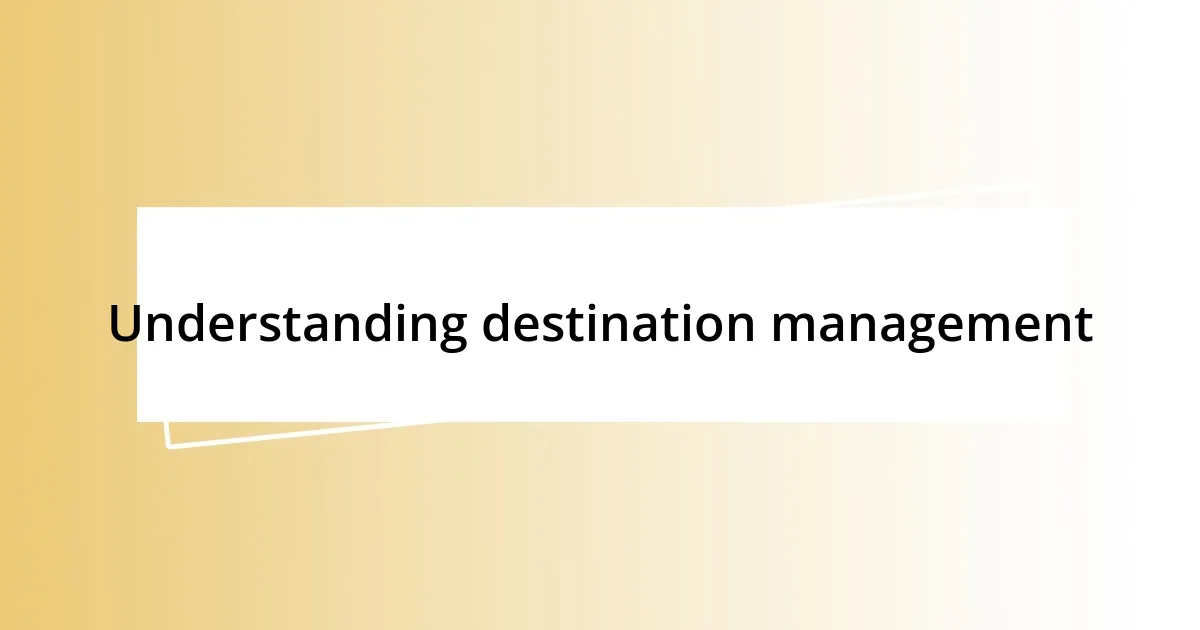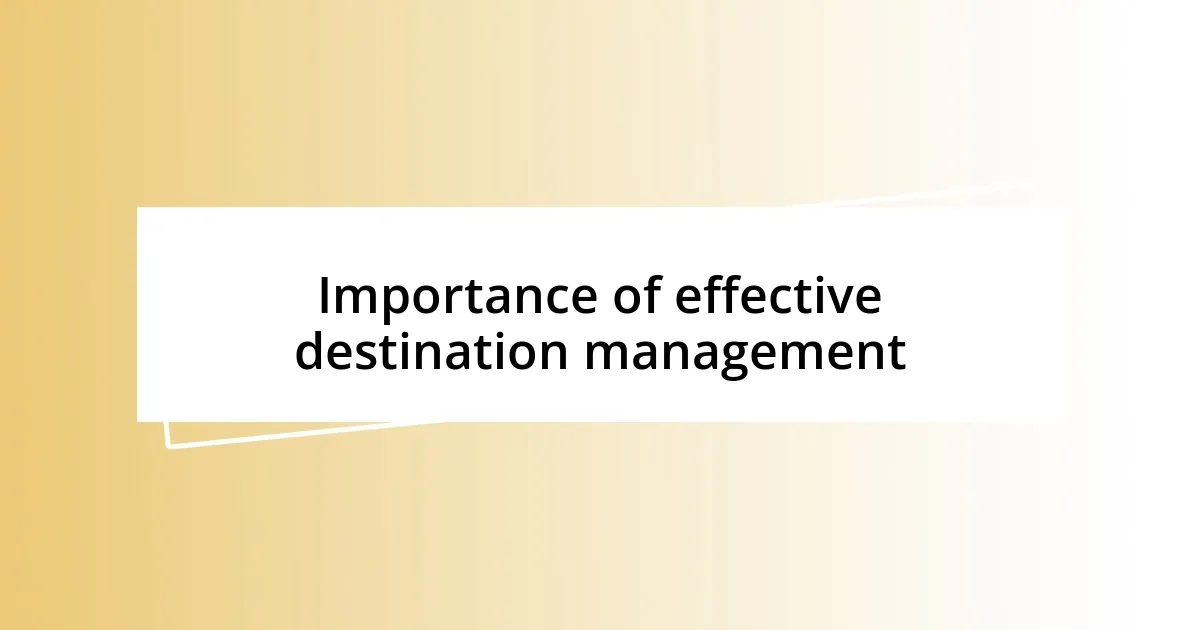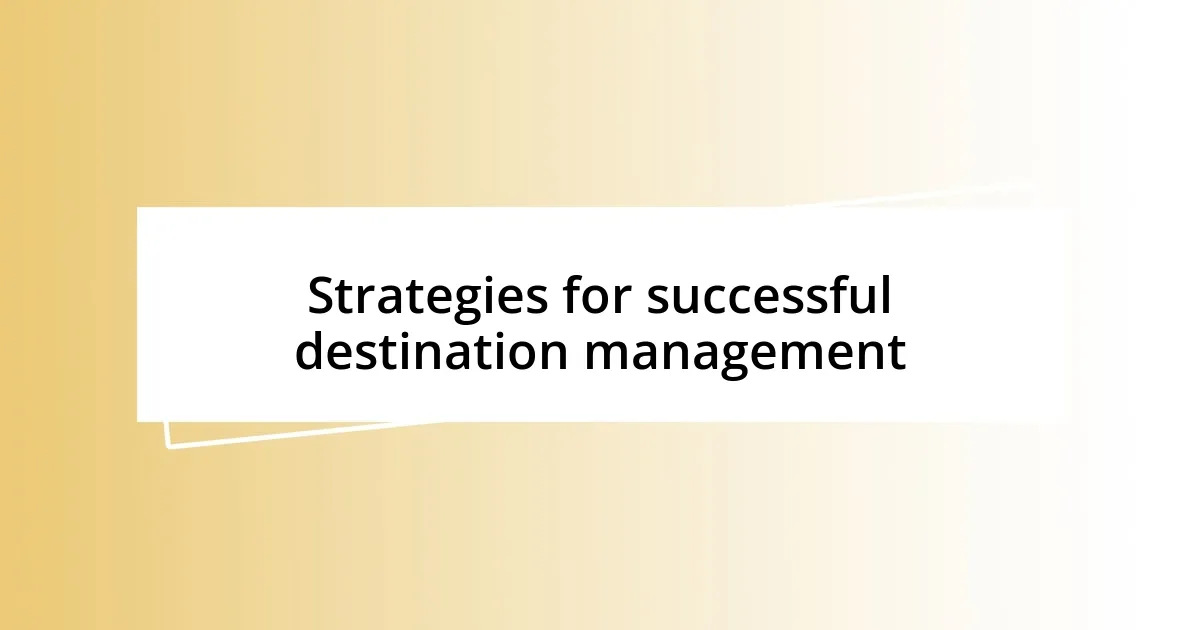Key takeaways:
- Destination management involves collaboration among local communities, businesses, and government to create authentic experiences while boosting the economy.
- Effective strategies include stakeholder partnerships, utilizing technology for visitor feedback, and promoting sustainable tourism initiatives.
- Future trends focus on personalization of travel experiences and the use of artificial intelligence to enhance destination marketing.
- Emphasis on sustainability is growing as travelers seek responsible practices that protect the environment and cultural heritage.

Understanding destination management
Destination management is about curating experiences that resonate with visitors while preserving the integrity of the locale. I recall a trip I took where the local tourism board successfully highlighted both the natural beauty and cultural nuances of the area. It made me wonder: how do destinations balance commercial interests with authentic representation?
At its core, destination management involves collaboration among various stakeholders, including local communities, businesses, and government entities. I’ve seen firsthand how such collaboration can transform a struggling town into a thriving tourist hotspot. When all parties are involved, the result isn’t just a financial boost but also a shared sense of pride in what makes that place unique.
I often think about the emotional connection people have with a destination. Have you ever visited a place that left a lasting impression? That’s destination management at work—crafting an identity for a locale that connects on a deeper level, engaging visitors not just through sights, but through stories and shared experiences.

Importance of effective destination management
Effective destination management is essential for creating experiences that leave lasting impressions on travelers. I once visited a vineyard where the owners not only wine-tasted but shared their history and farming practices. That personal touch made all the difference; it wasn’t just about the wine, it was about the story behind it. This connection is what makes destination management vital—it fosters that emotional link between visitors and the locale, ensuring they leave with cherished memories.
Here are some key reasons why effective destination management matters:
- Economic Benefits: It can significantly boost local economies by attracting tourists and creating jobs.
- Sustainability: Proper management helps protect and preserve the environment and cultural heritage.
- Community Involvement: Engaging locals ensures that their voices are heard and their identities are reflected in the tourism experience.
- Quality of Experience: A well-managed destination guarantees that visitors enjoy their stay, prompting them to return or recommend it to others.
- Crisis Management: Effective destination management prepares areas to handle unforeseen events, safeguarding both visitors and the local community.

Key components of destination management
When I think about the key components of destination management, a few essentials come to mind. First and foremost, stakeholder collaboration stands out. I recall a charming seaside town where local fishermen, restaurant owners, and tourism officials banded together to create a festival that celebrated their maritime culture. This joint effort not only drew visitors but fostered a sense of community pride. It’s clear to me that when everyone works together, the whole destination benefits.
Another vital component is the continuous assessment of visitor experience. I once stayed at a resort where they actively sought feedback from guests about their stay. This genuine effort to improve is something I find crucial. By listening to visitors, destinations can adapt and enhance what they offer, ensuring that experiences are not just good, but memorable.
Lastly, marketing strategies play a pivotal role. I remember seeing a promotional campaign for a mountain town that used stunning visuals of local hikes alongside stories from previous visitors. This approach not only showcased the scenic beauty but also created an emotional connection. In my view, effective marketing is more than just advertising; it’s about storytelling that invites people to be part of the experience.
| Component | Description |
|---|---|
| Stakeholder Collaboration | Joint efforts among locals to enhance the destination’s appeal. |
| Visitor Experience Assessment | Continuous feedback loops to improve the traveler’s journey. |
| Marketing Strategies | Storytelling that engages potential visitors emotionally. |

Strategies for successful destination management
One effective strategy for successful destination management is fostering strong partnerships among local stakeholders. I recall attending a local arts festival where artisans, restaurant owners, and tourism reps collaborated seamlessly. The result? A vibrant event that beautifully showcased the region’s culture and cuisine. This got me thinking: how often do we overlook the power of collaboration in enhancing a visitor’s experience? When everyone comes together, it creates a richer, more compelling narrative for travelers.
Another critical approach is utilizing technology to monitor and enhance visitor experiences. I remember visiting a tech-driven city where real-time data from visitor feedback apps informed management decisions. It felt refreshing to know that my thoughts could impact ongoing experiences. Have you ever wished your suggestions were heard? Embracing technology not only allows for immediate improvements but also demonstrates to visitors that their opinions are valued.
Lastly, promoting sustainable tourism initiatives stands out as a strategy that brings a sense of responsibility into the mix. During a hiking trip, I encountered a community actively preserving trails while educating visitors on environmental impact. It struck me how sustainability isn’t just a buzzword; it can create an emotional connection through shared values. Isn’t it heartwarming to know that by choosing responsible destinations, we’re also safeguarding them for future generations? This approach resonates deeply with today’s conscientious travelers, who want to leave a positive mark.

Future trends in destination management
The future of destination management is undoubtedly leaning towards personalization, where tailored experiences will become the norm. I recall a trip I took where a service suggested itineraries based on my previous travel history and preferences, creating a uniquely personal journey. Wouldn’t it be amazing if every traveler could have that kind of experience, feeling like their needs were not just met, but anticipated?
Another trend I’m observing is the shift toward leveraging artificial intelligence in destination marketing. Imagine walking through a city and receiving personalized recommendations through your smartphone, based on your location and interests. I experienced this in a bustling metropolis where an app guided me to hidden gems I wouldn’t have found otherwise. It seems to me that as we embrace technology, we’re not just enhancing efficiency; we’re enriching the traveler’s adventure in profound ways.
Finally, sustainability will only grow in importance as travelers become increasingly aware of their environmental footprint. I recently visited a place where eco-conscious practices were front and center, from renewable energy used in hotels to eco-friendly transportation options. Doesn’t it feel good to support destinations that genuinely care for the planet? The more we prioritize sustainable practices in destination management, the more we’re likely to attract those mindful travelers who share our vision for a better world.














